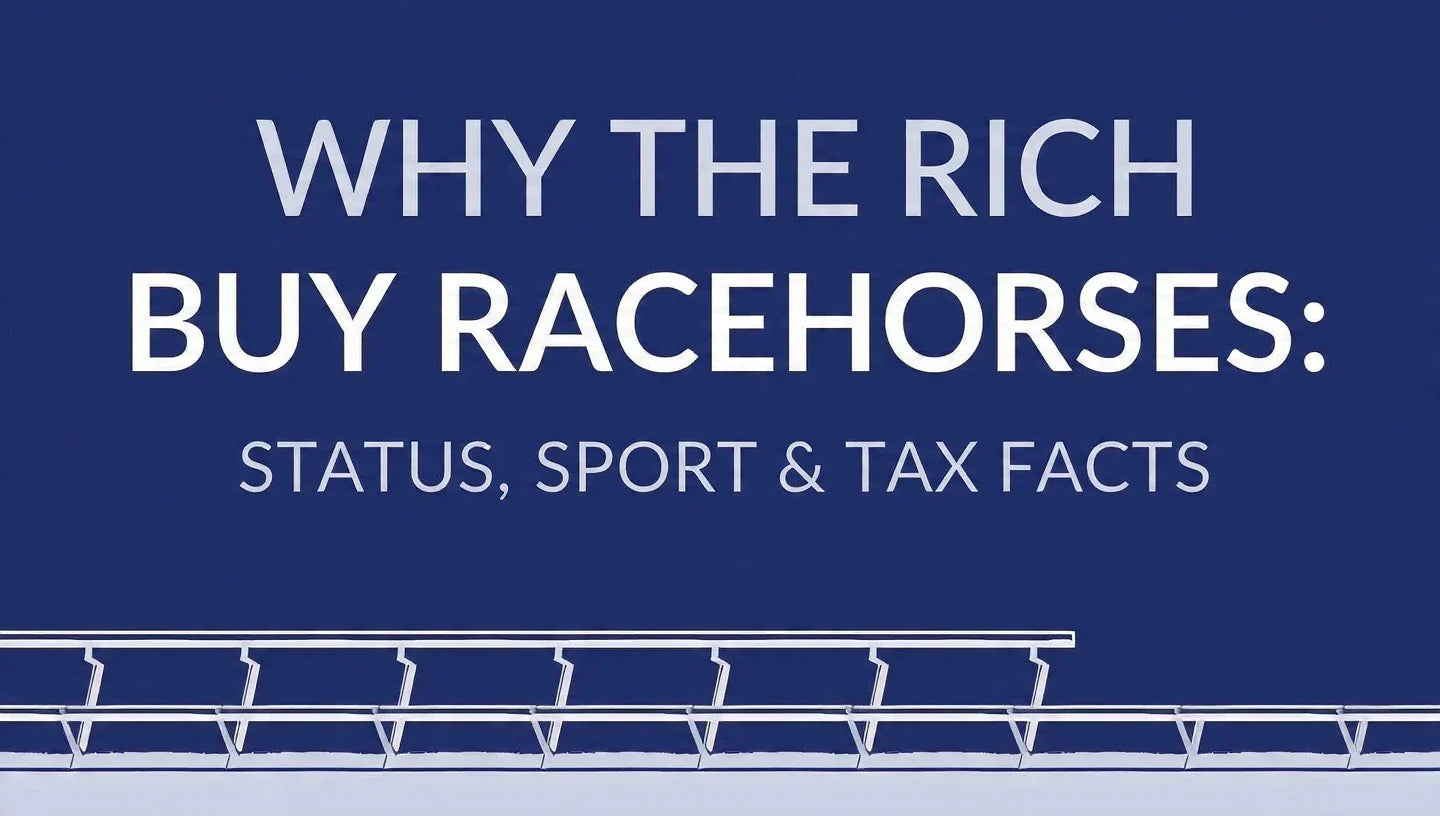Why the Ultra-Rich Buy Racehorses: Status, Sport, Speculation & Smart Tax Realities
Owning a racehorse might seem like a lavish indulgence — but for the world’s wealthiest, it’s rarely just about racing. It’s a mix of legacy, lifestyle, networking, and tax planning — with a sprinkle of high-risk speculation. 🏇
Let’s dive into why racehorses have become a powerful symbol for the rich — and what the real financial and #taxplanning angles look like behind the glamour.
1. Status, Legacy & the Power of Symbolism
For centuries, the horse has symbolized power and wealth. A luxury car depreciates, but a thoroughbred on an estate tells a deeper story — one of tradition, patience, and lineage.
At events like Royal Ascot or the Kentucky Derby, ownership isn’t just about racing — it’s about belonging to a heritage circle. Families often treat their horses like heirlooms: “We bred this line. Our stable goes back generations.”
Owning a horse means owning a piece of prestige — something only a few can truly afford.

2. Sport, Social Clubs & Billionaire Networking
Racehorse ownership is also a ticket to elite social access. The racetrack is where business meets leisure — high-net-worth individuals connect, deals are discussed, and alliances are built.
Syndicates and joint ownerships make entry easier, but the purpose remains the same — it’s about being seen in the right circles.
Think of it as “networking in motion” — every race is a live event filled with CEOs, investors, and family offices.

3. When Racing Turns into Business: Breeding & Stud Fees
Here’s where the numbers get real. The true profit potential lies not in racing itself but in breeding champions. A top stallion can earn millions in stud fees — often more than it ever did on the track.
However, this upside is rare. Tax authorities like the UK’s HMRC usually classify racing as a hobby, not a trade, unless it’s tied to breeding and commercial operations.
So, only if you combine racing, breeding, and sales with business intent can it be seen as a legitimate enterprise.

4. Speculation & Trophy Investing
Some wealthy investors see racehorses as high-stakes collectibles — like rare art or vintage cars. They buy foals or yearlings hoping to flip them for huge profits.
But reality bites: studies show that most horses never recover their costs. From purchase and training to insurance and upkeep, the numbers often go red.
Cases like McMorris v HMRC in the UK reaffirm this — the tribunal ruled horse ownership as a hobby, not a trade, so losses couldn’t offset tax.
In short: unless you operate at commercial scale, racehorse ownership is a passion, not a profit engine.

5. Tax & Structuring Realities: No Free Rides 🧾
Many assume buying a horse brings easy tax benefits — not true. The tax treatment depends on intent. If you buy for prestige, it’s a personal hobby; if you breed, sell, or run it commercially, it can qualify as a trade.
In the UK:
-
Prize money alone doesn’t qualify as business income.
-
To claim #taxdeductions, you must show income sources like sponsorships, breeding fees, or commercial activities.
-
Only racing tied to a breeding business may be treated as taxable.
In New Zealand:
-
The IRD views most racing syndicates as private hobbies, not taxable businesses.
-
Losses can’t be offset unless the activity meets strict business tests.
So while there are legitimate #taxplanning structures, they only work if you operate like a business, not a hobbyist.
6. The Business Models the Wealthy Prefer
Here’s how UHNW (Ultra-High-Net-Worth) families typically structure racehorse ownership:
-
Syndicates / Shared Ownership: Split costs, enjoy prestige, lower entry risk.
-
Vertical Integration: Race → Breed → Sell → Collect fees (a full-cycle model).
-
Hospitality & Branding: Use stables as branding tools, host clients, and elevate brand presence.
-
Land Structuring: Register estates as agricultural land, gain valuation and tax efficiency.
-
Speculative Buys: Buy young horses to sell post-race success — rare, but high upside.
Each path requires clear intent, professional management, and financial discipline.
7. Emotional & Lifestyle Reasons (The Hidden Driver ❤️)
At its core, owning a racehorse is emotional. The wealthy don’t just chase returns — they chase the thrill, the legacy, the story.
-
The adrenaline of race day 🏆
-
The pride of owning a champion
-
The continuation of family tradition
-
The community and recognition
Even if the spreadsheets go negative, the status ROI remains positive. And that’s why the rich keep investing.
8. Thinking About Entering the World of Racehorses?
Before you gallop in, here’s a quick checklist:
-
Define your goal — Prestige or profit?
-
Hire experts — Trainer, bloodstock agent, and tax advisor.
-
Start small — Join a syndicate first.
-
Build business intent — Keep records, create sponsorship revenue, maintain accounts.
-
Plan your taxes — Understand local laws on hobby vs trade.
-
Stay realistic — Most returns are emotional, not financial.
Final Takeaway
For the ultra-rich, racehorses are more about legacy and lifestyle than guaranteed gain.
The social access, emotional satisfaction, and brand elevation often outweigh the spreadsheets.
Still, understanding the tax and business framework is essential if you want to ride smart — not just rich.
🧾 Shunyatax Global says that business success starts with financial clarity. We specialize in end-to-end auditing services, bookkeeping, and business setup in Dubai — helping entrepreneurs and global investors build compliant, scalable ventures across borders.
🚀 Start your journey with us today:
👉 📞 Book a Consultation: Shunyatax Global: 1-1-confidential-advisory
👉 🌐 Visit Our Website: Shunyatax Global Services
👉 📧 Email Us: urgent@shunyatax.in


Share:
How to Relocate and Invest in Real Estate in Cyprus: The Story of Ioannis & Koshaya
Round Tripping via Mauritius: How Indian Money Returns Home